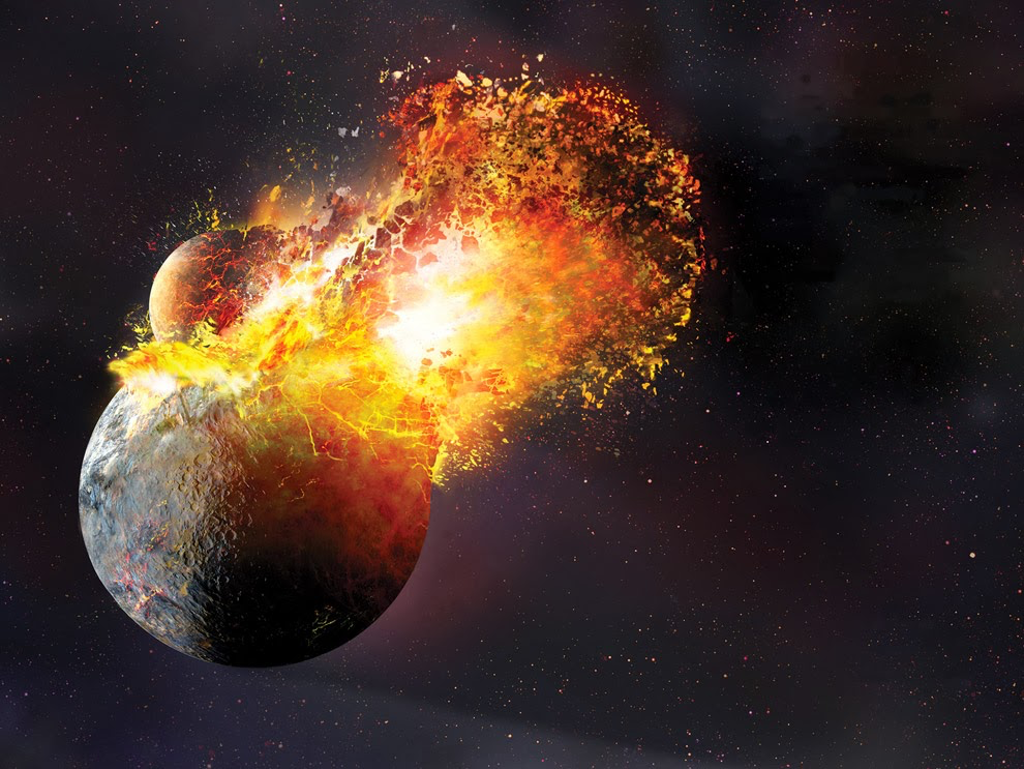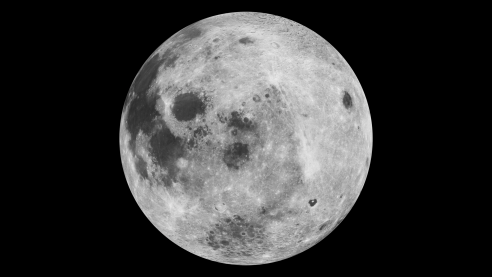In the digital age - art, technology and science are merging together to create an art form known as 'SciArt'. One of the benefits of SciArt is sharing scientific research to a wider audience.
The Earth’s Reflection is a SciArt collaboration between The Open University’s Dr Mahesh Anand, a Reader in Planetary Science and Exploration and Yazz Ahmed, a trumpet and flugelhorn player of British Bahraini heritage. She seeks to blur the lines between jazz, electronic sound design and the music of her mixed heritage.
Listen to the composition below:
Yazz explains: “The creative process for my composition began after meeting with Dr Mahesh Anand who suggested three themes I might like to explore - the birth of the Moon, the discovery of water and the possibility of living on the Moon in the future. The melody is an emotional response which I arrived at by improvising after meditating on these ideas, particularly the loneliness one might feel while living in such a barren landscape.”
Yazz constructed an accompanying track for the melody to float upon, composing the soundscape in her studio by recording a mixture of percussion instruments, including a dust-bin lid, and non-tonal trumpet sounds, with air pops from the tuning slides and the rattling of the valves. By organising, editing and manipulating these improvisations and using a variety of software as well as the digital equivalent of tape cutting - looping, a narrative began to emerge.
Mahesh has found the collaborative inspiring and educational. “This project has allowed me to achieve my vision of communicating findings from my scientific research to non-specialists using the medium of art.”
The Earth’s Reflection starts with the chaos and violence of the birth of the Moon from the collision of giant heavenly bodies, with the Moon gradually forming from the debris. The calm conclusion of the piece imagines a future moon dweller gazing at the reflection of the Earth in a pool of water.
References and further information
Yazz Ahmed’s music has been described as ‘psychedelic Arabic jazz, intoxicating and compelling’. In recent years she has led her ensembles in concerts in the UK and internationally. Yazz has also recorded and performed with Radiohead, Lee ‘Scratch’ Perry, amongst others. Her 2017 critically acclaimed album, La Saboteuse (Naim), has brought her to the attention of a global audience. Yazz is supported by PRS For Music Foundation. Yazz is currently working on completing the recording of her third album, Polyhymnia due for release in 2019.
The Earth’s Reflection is commissioned by The Open University and Sound UK. Supported by Arts Council England.
Discover more about the Moon
-
Apollo 11 and 50 years of research on Moon rocks
Read now to access more details of Apollo 11 and 50 years of research on Moon rocksThe first Moon landing is arguably the most important event for humankind. Dr Mahesh Anand and Dr Andrew G Tindle, shed light on the work which has taken place with the Moon rocks taken from that mission.

Article
Level: 1 Introductory
-
Explore Moon rocks collected from the first Moon landing
Take part now to access more details of Explore Moon rocks collected from the first Moon landingUse our Virtual Microscope to examine a selection of Moon rocks collected by Neil Armstrong and Buzz Aldrin, from the Apollo 11 mission in 1969.

Activity
Level: 1 Introductory
Watch our videos on the Moon
-
Mythbusting moons
Watch now to access more details of Mythbusting moonsWould we have tides if we had no Moon? Is a ‘supermoon’ an important event? Can moons have moons? Enjoy this short animation.

-
Moons of our Solar System
Learn more to access more details of Moons of our Solar SystemIn this free course, Moons of our Solar System, explore the many moons of our Solar System. Find out what makes them special. Should we send humans to our Moon again?

-
60 Second Adventures In Astronomy: The rotating moon
Watch now to access more details of 60 Second Adventures In Astronomy: The rotating moonDiscover how the Moon's orbit means we always see its best side...

-
The Moon
Learn more to access more details of The MoonAs the only planetary body everyone is familiar with seeing in the sky, the Moon has long been an object of fascination and speculation. This free course will teach you about the nearest planetary body to Earth: the missions to the Moon, the basic facts of its composition, the cratering on its surface, and the ancient eruptions that flooded many...

Study a free course on the Moon
-
Moons of our Solar System
Learn more to access more details of Moons of our Solar SystemIn this free course, Moons of our Solar System, explore the many moons of our Solar System. Find out what makes them special. Should we send humans to our Moon again?

-
The Moon
Learn more to access more details of The MoonAs the only planetary body everyone is familiar with seeing in the sky, the Moon has long been an object of fascination and speculation. This free course will teach you about the nearest planetary body to Earth: the missions to the Moon, the basic facts of its composition, the cratering on its surface, and the ancient eruptions that flooded many...

-
Microgravity: living on the International Space Station
Learn more to access more details of Microgravity: living on the International Space StationThis free badged open course, Microgravity: living on the International Space Station, will help you to consider microgravity environments in more detail than before! You will make direct comparisons of some important physical values between the International Space Station (ISS), the Earth and the Moon.



Rate and Review
Rate this audio
Review this audio
Log into OpenLearn to leave reviews and join in the conversation.
Audio reviews